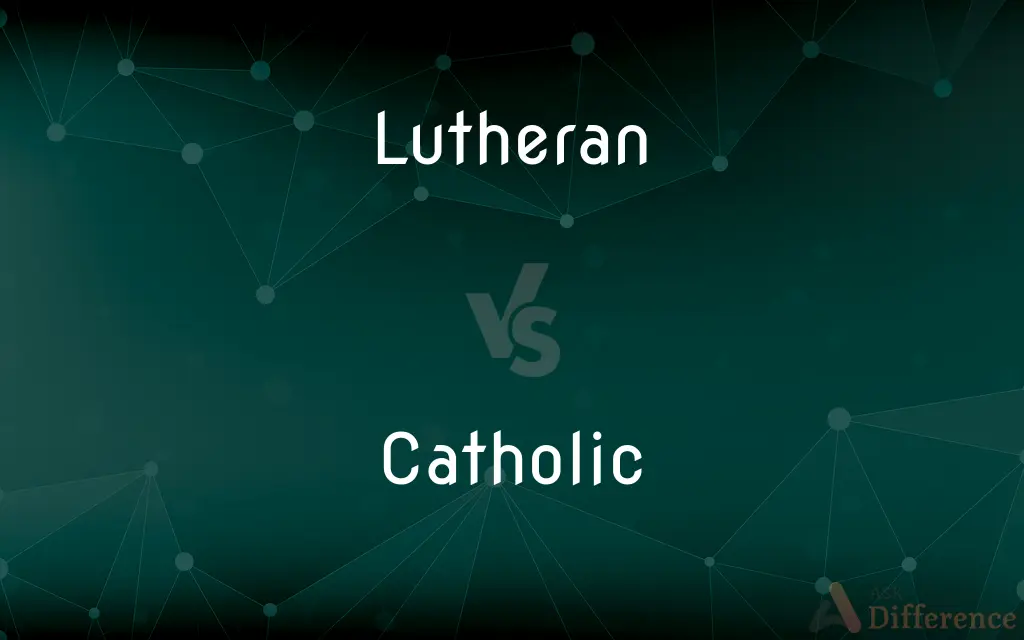Lutheran vs. Catholic — What's the Difference?
By Maham Liaqat & Urooj Arif — Updated on April 16, 2024
Lutheran theology centers on justification by faith alone, whereas Catholic doctrine emphasizes both faith and works for salvation.

Difference Between Lutheran and Catholic
Table of Contents
ADVERTISEMENT
Key Differences
Lutheranism was founded on the principles of Martin Luther's Reformation in the early 16th century, focusing on scripture alone as the source of divine knowledge. On the other hand, Catholicism holds to the tradition that both Scripture and sacred Tradition, as interpreted by the Church's magisterium, are equally authoritative.
Lutherans believe in justification by faith alone, meaning that salvation is received through faith in Jesus Christ without the necessity of good works. Whereas, Catholics believe that faith must be coupled with good works as part of the justification process.
In Lutheran practices, Communion is seen as a means of grace, with Christ's body and blood present "in, with, and under" the forms of bread and wine. Conversely, Catholics adhere to the doctrine of Transubstantiation, where the bread and wine become the actual body and blood of Christ.
Lutheran church governance typically includes a synodical structure with elected councils, emphasizing the priesthood of all believers. On the other hand, the Catholic Church is hierarchical and led by the Pope, bishops, and priests.
Regarding Mary and the saints, Lutherans generally view veneration as acceptable but do not seek their intercession to the extent practiced in Catholicism, which has a more pronounced focus on the saints' intercessory roles.
ADVERTISEMENT
Comparison Chart
Founding
Early 16th century by Martin Luther
1st century, tracing back to the apostles
Authority of Scripture
Scripture alone
Scripture and Tradition
Justification
By faith alone
By faith and works
Sacraments
Baptism and Communion
Seven sacraments including Confession, etc.
Church Structure
Synodical, congregational governance
Hierarchical with a strong central authority
Compare with Definitions
Lutheran
Pertaining to the doctrines of Lutheranism, especially emphasizing justification by faith.
The Lutheran view of grace is fundamentally distinct from other Christian denominations.
Catholic
Related to the global Catholic community which is noted for its cultural and ethnic diversity.
Catholic schools are found in many countries around the world.
Lutheran
A member of a Protestant church that follows the theological teachings and practices inspired by Martin Luther.
Lutherans gather for worship on Sundays at their local parish.
Catholic
Characteristic of the Catholic Church's emphasis on social justice and charity work.
Catholic charities play a major role in global humanitarian efforts.
Lutheran
Relating to the Lutheran Church, which has a synodical structure.
Lutheran churches often collaborate on community services and educational programs.
Catholic
Of or relating to the seven sacraments recognized by the Catholic Church.
Catholic rites of passage include Baptism, Confirmation, and Holy Orders.
Lutheran
Of or relating to the liturgical practices seen in Lutheran worship.
Lutheran liturgy typically includes hymns, scripture readings, and a sermon.
Catholic
A member of the Roman Catholic Church, under the leadership of the Pope.
Catholics are required to attend Mass every Sunday.
Lutheran
A cultural identity influenced by historical Lutheran presence, particularly in regions like Scandinavia and parts of Germany.
Lutheran traditions influence many of the Christmas celebrations in Germany.
Catholic
Pertaining to the beliefs and practices of the Catholic doctrine, such as the veneration of Mary and the saints.
Catholic teachings include the practice of praying the Rosary.
Lutheran
Of or relating to the religious doctrines of Martin Luther, especially the doctrine of justification by faith alone.
Catholic
Of the Roman Catholic faith.
Lutheran
Of or relating to the Protestant denomination adhering to these doctrines.
Catholic
A member of the Roman Catholic Church.
Lutheran
A member of the Lutheran Church.
Catholic
Of broad or liberal scope; comprehensive
"The 100-odd pages of formulas and constants are surely the most catholic to be found" (Scientific American).
Lutheran
Of or pertaining to Luther; adhering to the doctrines of Luther or the Lutheran Church.
Catholic
Including or concerning all humankind; universal
"what was of catholic rather than national interest" (J.A. Froude).
Lutheran
One who accepts or adheres to the doctrines of Luther or the Lutheran Church.
Catholic
Of or involving the Roman Catholic Church.
Lutheran
Follower of Lutheranism
Catholic
Of or relating to the universal Christian church.
Lutheran
Of or pertaining to Martin Luther or his teachings;
The Lutheran doctrine of justification by faith alone
Catholic
Of or relating to the ancient undivided Christian church.
Lutheran
Of or pertaining to or characteristic of the branch of the Protestant Church adhering to the views of Luther;
Lutheran doctrines
Catholic
Of or relating to those churches that have claimed to be representatives of the ancient undivided church.
Catholic
A member of a Catholic church, especially a Roman Catholic.
Catholic
Universal; all-encompassing.
Catholic
Alternative case form of Catholic.
Catholic
(obsolete) Common or prevalent; especially universally prevalent.
Catholic
Embracing all.
Catholic
Universally applicable.
Catholic
Of universal human interest or use.
Catholic
(slang) Permissive of unprotected sex.
Catholic
Universal or general; as, the catholic faith.
Men of other countries [came] to bear their part in so great and catholic a war.
Catholic
Not narrow-minded, partial, or bigoted; liberal; as, catholic tastes.
Catholic
Of or pertaining to, or affecting the Roman Catholics; as, the Catholic emancipation act.
Catholic
A person who accepts the creeds which are received in common by all parts of the orthodox Christian church.
Catholic
An adherent of the Roman Catholic church; a Roman Catholic.
Catholic
A member of a Catholic church
Catholic
Of or relating to or supporting Catholicism;
The Catholic Church
Catholic
Free from provincial prejudices or attachments;
Catholic in one's tastes
Common Curiosities
Can Lutherans take communion in a Catholic church?
Generally, Lutherans cannot take communion in Catholic churches due to differences in the understanding of the Eucharist.
What is the main theological difference between Lutheran and Catholic beliefs?
Lutherans believe in justification by faith alone, while Catholics see it as a combination of faith and works.
What is the significance of saints in both denominations?
Catholics actively venerate and pray to saints, considering them intercessors, whereas Lutherans respect them primarily as examples of faithful living.
Are the Bible translations different in Lutheran and Catholic churches?
Both denominations use different versions and translations of the Bible, with Catholics commonly using the New American Bible and Lutherans often using translations like the English Standard Version.
How do prayer practices differ between Lutherans and Catholics?
Catholics often use structured prayers like the Rosary and novenas, while Lutherans typically focus on spontaneous or liturgical prayers without the use of prayer beads.
What are the differences in church governance between Lutherans and Catholics?
Lutherans have a synodical or congregational form of governance, whereas Catholics have a hierarchical structure led by the Pope and bishops.
What is the approach of Lutherans and Catholics towards scripture and tradition?
Lutherans hold Scripture as the sole authority (sola scriptura), while Catholics treat Tradition and Scripture as coequal in authority.
What role does the Pope play in Lutheranism?
The Pope has no theological or governance authority in Lutheranism.
What is the Lutheran stance on confession?
While private confession exists in Lutheranism, it is not mandated as regularly as in Catholicism, where confession is a sacrament.
How do the views on the sacraments differ between Lutherans and Catholics?
Catholics recognize seven sacraments, while Lutherans typically recognize only two (Baptism and Communion) as sacraments.
How do Lutherans and Catholics celebrate the Eucharist?
Lutherans believe in the real presence of Christ "in, with, and under" the forms of bread and wine, whereas Catholics believe in Transubstantiation, where the substances of bread and wine become the actual body and blood of Christ.
How do Lutheran and Catholic views on the Virgin Mary differ?
Lutherans honor Mary as the mother of Jesus but do not seek her intercession to the extent that Catholics do.
Do Lutherans believe in the Pope's authority?
Lutherans do not recognize the Pope's authority, viewing him as a religious leader but not as their spiritual leader.
What is the role of marriage within Lutheran and Catholic teachings?
Both value marriage; however, Catholic priests take vows of celibacy, whereas Lutheran pastors may marry.
How do Lutherans and Catholics view the end times and eschatology?
Both share many fundamental Christian beliefs about the end times, but specific interpretations and emphases can vary, particularly regarding the role of the Church and the sacraments in the final days.
Share Your Discovery

Previous Comparison
Pick vs. Collect
Next Comparison
Pride vs. ArroganceAuthor Spotlight
Written by
Maham LiaqatCo-written by
Urooj ArifUrooj is a skilled content writer at Ask Difference, known for her exceptional ability to simplify complex topics into engaging and informative content. With a passion for research and a flair for clear, concise writing, she consistently delivers articles that resonate with our diverse audience.














































